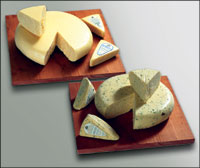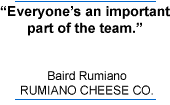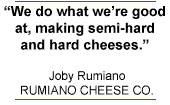 |
|||

|
 |

|
|

October 16, 2009 |
||
| Focus on quality, sustainability lead to award winners at Rumiano Cheese | ||
By Kate Sander CRESCENT CITY, Calif. — Quality and consistency in Rumiano Cheese Co.’s wide array of cheeses — more than 60 varieties — are what set the business apart from other cheese companies, say the third and fourth generations of the Rumiano family to run this northern California cheese company. “We have some of the finest milk in the nation here,” says Baird Rumiano, a third-generation cheesemaker who is a majority owner of the company along with his brother John. This, Baird Rumiano says, is one of the keys in the company producing quality, award-winning cheese. Rumiano Cheese makes its products in Crescent City, located roughly 10 miles from the The company’s cheeses include Monterey Jacks, Cheddars and Goudas, among others. The company particularly is known for its specialty: Dry Monterey Jack. Dry Jack is a California hard cheese that is aged nine months or more in cellars and climate-controlled environments to achieve a medium-to-sharp nutty flavor. A traditional coating consisting of black pepper dust, cocoa powder and oil is then applied. Rumiano Cheese also produces Peppato, a Dry Monterey Jack flavored with whole peppercorns. In addition to high-quality milk, the longevity and know-how of the company’s staff is critical, Rumiano adds. The company has roughly 150 employees, more than half of whom have been with Rumiano Cheese for more than 15 years. Master cheesemaker Alfred Mathys has been employed with the company for a quarter of a century.
“Everyone’s an important part of the team,” Rumiano says. • Variety of cheeses and brands Rumiano Cheese offers several organic, kosher and reduced-fat varieties of its cheeses as well as cheese in a number of formats. All of its cheeses are rbST-free. The American Humane Association also has approved the company as American Humane Certified Free Farmed. The Free Farmed program provides independent verification that livestock are raised humanely, in accordance with animal welfare standards set forth by American Humane. The majority of the company’s cheese is sold to foodservice distributors, but some cheese also is sold for retail and ingredient use. Recently the company has begun putting more emphasis on retail than it has in the past, says Joby Rumiano, Baird’s son who, along with his brother Tony, is the fourth generation of the family to work in the business. Brands under which the company’s cheeses are sold include Rumiano, Willow Maid, “We do what we’re good at, making semi-hard and hard cheeses,” Joby Rumiano says. The cheeses have won numerous awards. This summer, Rumiano Cheese’s Old Fashioned Monterey Jack won first place in the American Cheese Society contest’s American Originals: Monterey Jack, Cow’s Milk class and its Dry Monterey Jack placed second in the American Originals: Cow’s Milk class. The Dry Jack also won second place in the recent World Dairy Expo Championship Dairy Product Contest’s Hard Cheese Open Class. In addition, the U.S. Championship Cheese Contest this spring brought a second-place award in the Flavored Hard Cheeses class for the company’s Monterey Jack with whole black peppercorns. If that weren’t impressive enough, 2009 also included a gold, two silver and one bronze award at the California State Fair for its flavored Jacks, not to mention numerous other awards in the past five years. Making about 12 million pounds of cheese annually, the company is big enough to economically offer all of these top quality cheeses and yet small enough to be flexible. “We offer great quality at a good price,” says Joby Rumiano. • Building upon a long history Rumiano Cheese has built its market positioning over a long period of time. The company was founded in 1921 by brothers Richard, Fred and John Rumiano, three Italian immigrants, when the dairy farm they had bought in Willows, Calif., had grown large enough to experiment with cheese and butter making. By the mid-1930s, the enterprise had developed into eight factories and was one of the largest cheese companies in California, according to the Rumiano family. However, with the advent of more efficient methods of milk hauling and cheesemaking, larger plants became necessary and the Rumiano family sold all but two of its facilities. Today, the company operates its cheese manufacturing plant in Crescent City and its packaging and redistribution facility in Willows, where the company first started. Since Baird and John Rumiano purchased the company in 1980, they have shifted the company’s emphasis toward foodservice distribution and reinvesting in the company. It took time, but after roughly 18 years, the brothers were able to complete an entire refurbishment of the business, which included the installation of new tables, towers, vats and automated labelers. Most cheese made in Crescent City is produced in Stolting block formers and some of the product is hand rolled wheels. Meanwhile, 300 miles to the southeast in Willows, the company handles its own cheeses as well as hundreds of other types of domestic and imported cheeses. The Willows operation includes two cut-and-wrap operations. Three Cryovac shrink packaging lines produce custom cheese packages of all styles and shapes ranging from 4 ounces to 10 pounds. The Cryovac lines produce approximately 6 million pounds annually. The slicing operation consists of two lines. Packages ranging from 4 ounces to 2 pounds are produced with interleaving and zipper availability. The slicing operation currently produces approximately 5-6 million pounds annually, bringing combined sales to approximately 35 million pounds annually. The company’s cheeses primarily are sold in the West but can be found nationwide. The company also exports. • Sustainability for the future As Rumiano Cheese has invested in production and packaging, it also has invested in sustainability features. The largest such investment to date is the company’s wastewater treatment facility at its Crescent City plant. Brought on line in 2005, the Rumiano Cheese wastewater treatment facility biologically treats approximately 20,000 gallons of cheese production wash water per day. The wastewater treatment plant decreases the plant’s biological loadings to the city by 99 percent, with the treated water being discharged directly to the ocean. The treatment process produces a ton of bio-solids per day. This nutrient-rich liquid is returned to local dairy farmers and applied with their cow manure to enhance their pastures, greatly decreasing their dependence and use of fossil fuel-based fertilizers, the Rumiano brothers say. The company also utilizes liquid ring vacuum pumps. To lower the amount of water used daily in production, Rumiano Cheese installed a water recirculation system, reducing water demand by 1.3 million gallons per year. Water recirculation also occurs on the vats and the boilers, taking the condensation from the steam after cooking the cheese and reintroducing it back into the steam line to be used again for heating. Other sustainability efforts include energy-efficient lights and an extensive recycling program. Looking to the future, Baird Rumiano says the family will continue reinvesting in the business in any way that will continue to improve it. “Every year we try to put money back in the plant, continuing to improve quality and increase efficiency,” he says. CMN
|
||
| CMN article search |
|
|
© 2024 Cheese Market News • Quarne Publishing, LLC • Legal Information • Online Privacy Policy • Terms and Conditions
Cheese Market News • Business/Advertising Office: P.O. Box 628254 • Middleton, WI 53562 • 608/831-6002
Cheese Market News • Editorial Office: 5315 Wall Street, Suite 100 • Madison, WI 53718 • 608/288-9090

 Oregon border in northern California. The company receives its milk supply from independent third- and fourth-generation dairy farmers within a 90-mile radius, farmers who milk almost exclusively Jerseys. The area’s mild climate and abundant rainfall stimulates feed growth and allows for yearlong grazing. All of this contributes to the cheese’s creaminess and distinctive yellow color, Rumiano says. The only cheese the company makes that it adds color to is its Cheddar, he notes.
Oregon border in northern California. The company receives its milk supply from independent third- and fourth-generation dairy farmers within a 90-mile radius, farmers who milk almost exclusively Jerseys. The area’s mild climate and abundant rainfall stimulates feed growth and allows for yearlong grazing. All of this contributes to the cheese’s creaminess and distinctive yellow color, Rumiano says. The only cheese the company makes that it adds color to is its Cheddar, he notes. The company isn’t big on titles.
The company isn’t big on titles. California Mission – David Jack Series, California Premium, Rumiano Organic, Landmark and Deli Fresh/Green Valley.
California Mission – David Jack Series, California Premium, Rumiano Organic, Landmark and Deli Fresh/Green Valley.